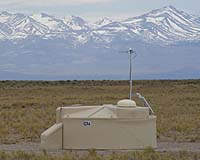 |
Madison, Wis. (UPI) Oct 18, 2010 A "telescope" deep under Antarctica's ice has found the first signals scientists say may explain mysterious particles that shower the Earth from outer space. Researchers, hoping to explain what produces cosmic rays and elusive particles called neutrinos that constantly bombard our planet, buried sensors a mile below the Antarctica's ice cap to detect fleeting flashes of light caused when these high energy particles and rays collide with atoms in the ice, The Daily Telegraph reported Monday. The collisions are so rare only a few will be recorded each year, but the scientists say they have already detected collisions since the first sensors were buried in 2006, the British newspaper said. The pattern of light recorded by the sensors allows scientists to plot the trajectory of the particles and rays to determine where in the galaxy they originated. Although the last of its sensors won't be installed until December, researchers have already begun analyzing data from the $271 million IceCube Neutrino Observatory. The data shows a concentration of cosmic rays coming from an area close to the constellation of Vela in the skies of the Southern Hemisphere, known to be an area of space emitting large amounts of radiation throughout the galaxy. Scientists say when the observatory is finished they will be able to accurately identify the source of the stream of high energy cosmic rays and neutrinos. Eventually the researchers on the project, being led by the University of Wisconsin, Madison, will bury more than 5,000 optical sensors deep in the ice, covering an area of about 1 cubic kilometer, about 0.2 cubic miles.
Share This Article With Planet Earth
Related Links Stellar Chemistry, The Universe And All Within It
 Cosmic Accelerators Discovered In Our Galaxy
Cosmic Accelerators Discovered In Our GalaxyLos Angeles CA (SPX) Aug 20, 2010 Physicists from UCLA and Japan have discovered evidence of "natural nuclear accelerators" at work in our Milky Way galaxy, based on an analysis of data from the world's largest cosmic ray detector. Cosmic rays of the highest energies were believed by physicists to come from remote galaxies containing enormous black holes capable of consuming stars and accelerating protons at energies compa ... read more |
|
| The content herein, unless otherwise known to be public domain, are Copyright 1995-2010 - SpaceDaily. AFP and UPI Wire Stories are copyright Agence France-Presse and United Press International. ESA Portal Reports are copyright European Space Agency. All NASA sourced material is public domain. Additional copyrights may apply in whole or part to other bona fide parties. Advertising does not imply endorsement,agreement or approval of any opinions, statements or information provided by SpaceDaily on any Web page published or hosted by SpaceDaily. Privacy Statement |